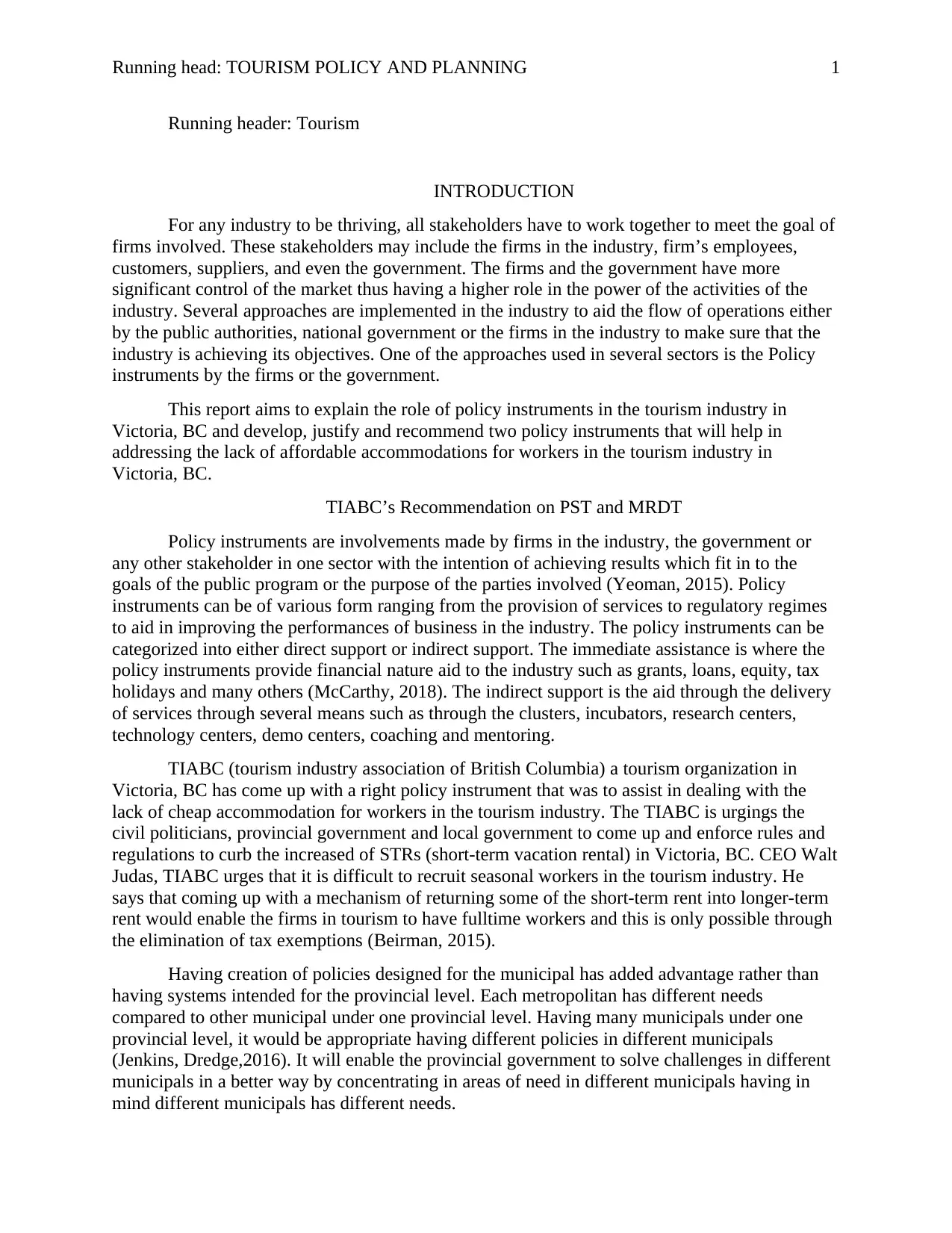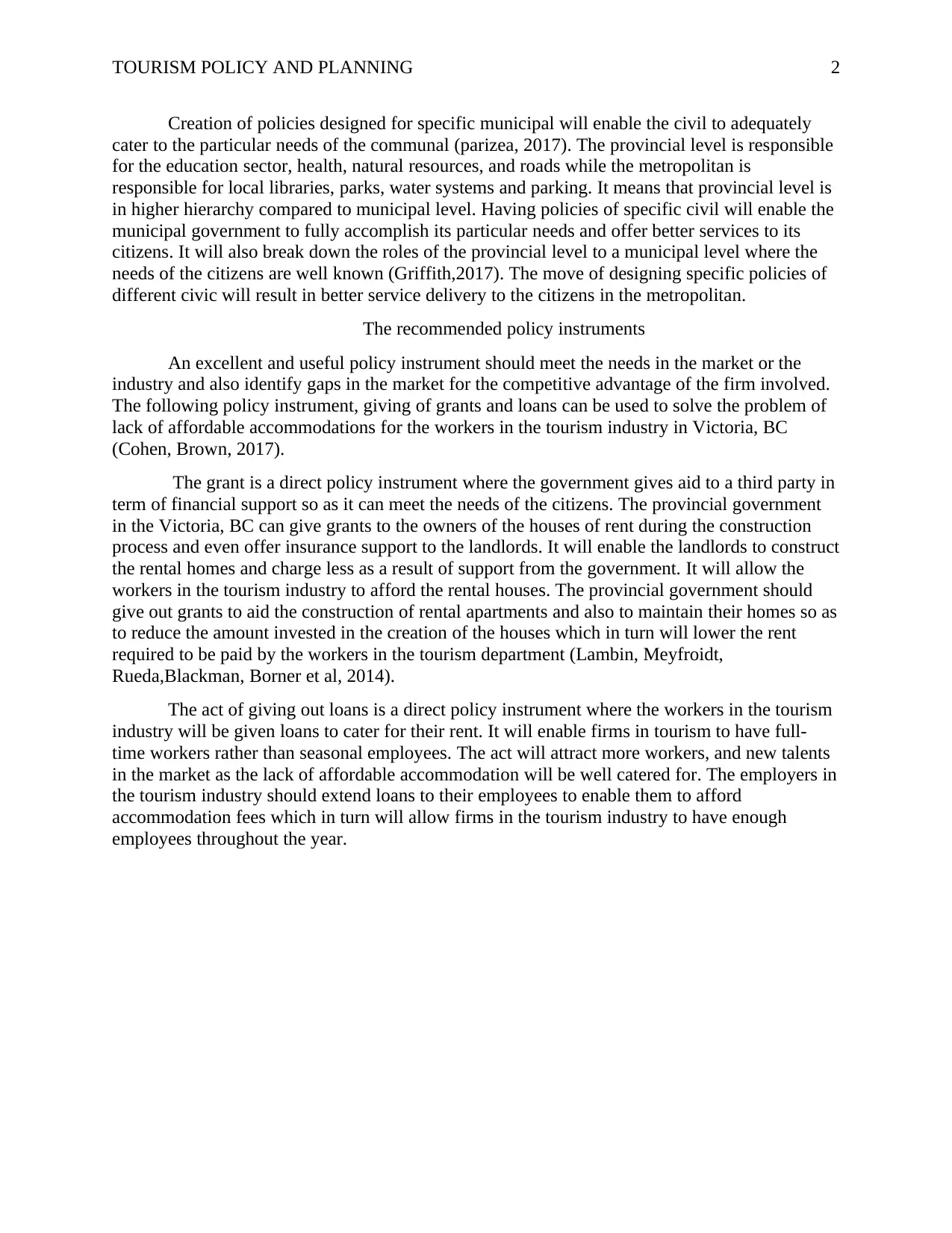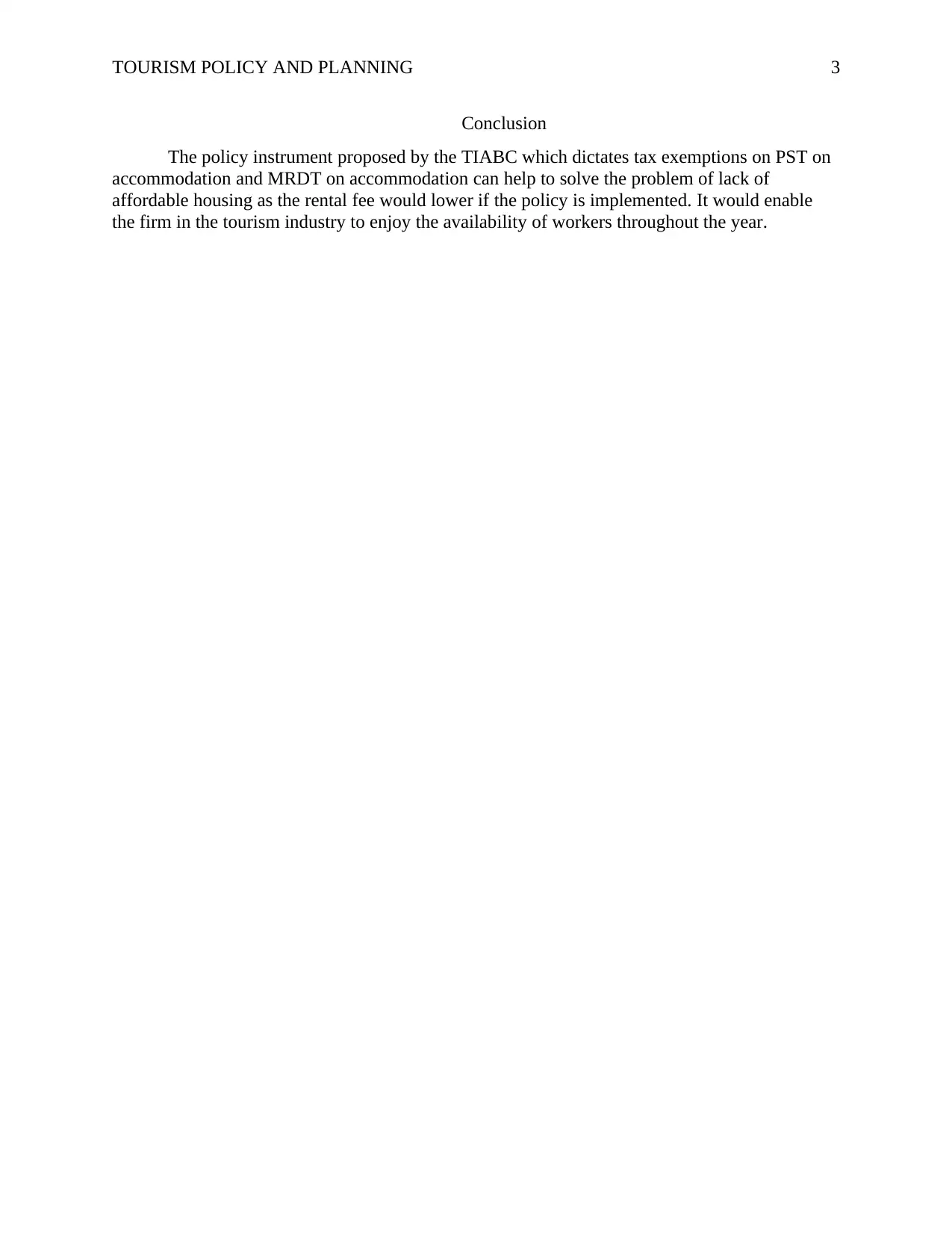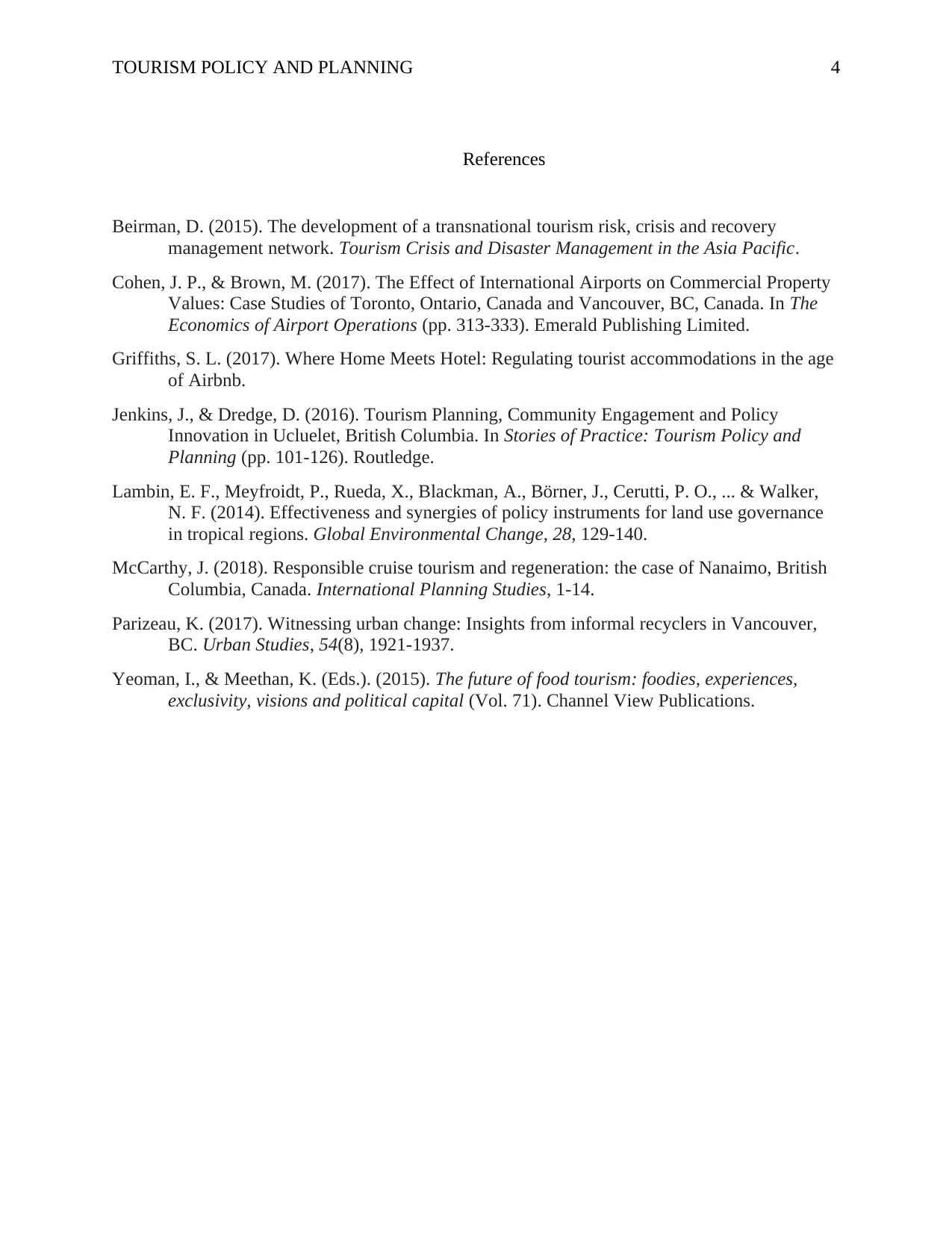Evaluating Policy Instruments for Tourism Accommodation in Victoria
VerifiedAdded on 2023/05/30
|4
|1482
|273
Report
AI Summary
This report examines the role of policy instruments in Victoria, BC's tourism industry, focusing on addressing the lack of affordable accommodation for tourism workers. It discusses the recommendations of the Tourism Industry Association of British Columbia (TIABC) regarding PST and MRDT, highlighting the advantages of municipal-level policies. The report recommends direct policy instruments such as grants and loans to support rental housing construction and provide financial aid to tourism workers, aiming to attract and retain a stable workforce. Ultimately, the report suggests that implementing TIABC's proposed tax exemptions on accommodation can lower rental fees and ensure a consistent workforce for the tourism industry. Desklib provides access to similar assignments and past papers for students.

Running head: TOURISM POLICY AND PLANNING 1
Running header: Tourism
INTRODUCTION
For any industry to be thriving, all stakeholders have to work together to meet the goal of
firms involved. These stakeholders may include the firms in the industry, firm’s employees,
customers, suppliers, and even the government. The firms and the government have more
significant control of the market thus having a higher role in the power of the activities of the
industry. Several approaches are implemented in the industry to aid the flow of operations either
by the public authorities, national government or the firms in the industry to make sure that the
industry is achieving its objectives. One of the approaches used in several sectors is the Policy
instruments by the firms or the government.
This report aims to explain the role of policy instruments in the tourism industry in
Victoria, BC and develop, justify and recommend two policy instruments that will help in
addressing the lack of affordable accommodations for workers in the tourism industry in
Victoria, BC.
TIABC’s Recommendation on PST and MRDT
Policy instruments are involvements made by firms in the industry, the government or
any other stakeholder in one sector with the intention of achieving results which fit in to the
goals of the public program or the purpose of the parties involved (Yeoman, 2015). Policy
instruments can be of various form ranging from the provision of services to regulatory regimes
to aid in improving the performances of business in the industry. The policy instruments can be
categorized into either direct support or indirect support. The immediate assistance is where the
policy instruments provide financial nature aid to the industry such as grants, loans, equity, tax
holidays and many others (McCarthy, 2018). The indirect support is the aid through the delivery
of services through several means such as through the clusters, incubators, research centers,
technology centers, demo centers, coaching and mentoring.
TIABC (tourism industry association of British Columbia) a tourism organization in
Victoria, BC has come up with a right policy instrument that was to assist in dealing with the
lack of cheap accommodation for workers in the tourism industry. The TIABC is urgings the
civil politicians, provincial government and local government to come up and enforce rules and
regulations to curb the increased of STRs (short-term vacation rental) in Victoria, BC. CEO Walt
Judas, TIABC urges that it is difficult to recruit seasonal workers in the tourism industry. He
says that coming up with a mechanism of returning some of the short-term rent into longer-term
rent would enable the firms in tourism to have fulltime workers and this is only possible through
the elimination of tax exemptions (Beirman, 2015).
Having creation of policies designed for the municipal has added advantage rather than
having systems intended for the provincial level. Each metropolitan has different needs
compared to other municipal under one provincial level. Having many municipals under one
provincial level, it would be appropriate having different policies in different municipals
(Jenkins, Dredge,2016). It will enable the provincial government to solve challenges in different
municipals in a better way by concentrating in areas of need in different municipals having in
mind different municipals has different needs.
Running header: Tourism
INTRODUCTION
For any industry to be thriving, all stakeholders have to work together to meet the goal of
firms involved. These stakeholders may include the firms in the industry, firm’s employees,
customers, suppliers, and even the government. The firms and the government have more
significant control of the market thus having a higher role in the power of the activities of the
industry. Several approaches are implemented in the industry to aid the flow of operations either
by the public authorities, national government or the firms in the industry to make sure that the
industry is achieving its objectives. One of the approaches used in several sectors is the Policy
instruments by the firms or the government.
This report aims to explain the role of policy instruments in the tourism industry in
Victoria, BC and develop, justify and recommend two policy instruments that will help in
addressing the lack of affordable accommodations for workers in the tourism industry in
Victoria, BC.
TIABC’s Recommendation on PST and MRDT
Policy instruments are involvements made by firms in the industry, the government or
any other stakeholder in one sector with the intention of achieving results which fit in to the
goals of the public program or the purpose of the parties involved (Yeoman, 2015). Policy
instruments can be of various form ranging from the provision of services to regulatory regimes
to aid in improving the performances of business in the industry. The policy instruments can be
categorized into either direct support or indirect support. The immediate assistance is where the
policy instruments provide financial nature aid to the industry such as grants, loans, equity, tax
holidays and many others (McCarthy, 2018). The indirect support is the aid through the delivery
of services through several means such as through the clusters, incubators, research centers,
technology centers, demo centers, coaching and mentoring.
TIABC (tourism industry association of British Columbia) a tourism organization in
Victoria, BC has come up with a right policy instrument that was to assist in dealing with the
lack of cheap accommodation for workers in the tourism industry. The TIABC is urgings the
civil politicians, provincial government and local government to come up and enforce rules and
regulations to curb the increased of STRs (short-term vacation rental) in Victoria, BC. CEO Walt
Judas, TIABC urges that it is difficult to recruit seasonal workers in the tourism industry. He
says that coming up with a mechanism of returning some of the short-term rent into longer-term
rent would enable the firms in tourism to have fulltime workers and this is only possible through
the elimination of tax exemptions (Beirman, 2015).
Having creation of policies designed for the municipal has added advantage rather than
having systems intended for the provincial level. Each metropolitan has different needs
compared to other municipal under one provincial level. Having many municipals under one
provincial level, it would be appropriate having different policies in different municipals
(Jenkins, Dredge,2016). It will enable the provincial government to solve challenges in different
municipals in a better way by concentrating in areas of need in different municipals having in
mind different municipals has different needs.
Paraphrase This Document
Need a fresh take? Get an instant paraphrase of this document with our AI Paraphraser

TOURISM POLICY AND PLANNING 2
Creation of policies designed for specific municipal will enable the civil to adequately
cater to the particular needs of the communal (parizea, 2017). The provincial level is responsible
for the education sector, health, natural resources, and roads while the metropolitan is
responsible for local libraries, parks, water systems and parking. It means that provincial level is
in higher hierarchy compared to municipal level. Having policies of specific civil will enable the
municipal government to fully accomplish its particular needs and offer better services to its
citizens. It will also break down the roles of the provincial level to a municipal level where the
needs of the citizens are well known (Griffith,2017). The move of designing specific policies of
different civic will result in better service delivery to the citizens in the metropolitan.
The recommended policy instruments
An excellent and useful policy instrument should meet the needs in the market or the
industry and also identify gaps in the market for the competitive advantage of the firm involved.
The following policy instrument, giving of grants and loans can be used to solve the problem of
lack of affordable accommodations for the workers in the tourism industry in Victoria, BC
(Cohen, Brown, 2017).
The grant is a direct policy instrument where the government gives aid to a third party in
term of financial support so as it can meet the needs of the citizens. The provincial government
in the Victoria, BC can give grants to the owners of the houses of rent during the construction
process and even offer insurance support to the landlords. It will enable the landlords to construct
the rental homes and charge less as a result of support from the government. It will allow the
workers in the tourism industry to afford the rental houses. The provincial government should
give out grants to aid the construction of rental apartments and also to maintain their homes so as
to reduce the amount invested in the creation of the houses which in turn will lower the rent
required to be paid by the workers in the tourism department (Lambin, Meyfroidt,
Rueda,Blackman, Borner et al, 2014).
The act of giving out loans is a direct policy instrument where the workers in the tourism
industry will be given loans to cater for their rent. It will enable firms in tourism to have full-
time workers rather than seasonal employees. The act will attract more workers, and new talents
in the market as the lack of affordable accommodation will be well catered for. The employers in
the tourism industry should extend loans to their employees to enable them to afford
accommodation fees which in turn will allow firms in the tourism industry to have enough
employees throughout the year.
Creation of policies designed for specific municipal will enable the civil to adequately
cater to the particular needs of the communal (parizea, 2017). The provincial level is responsible
for the education sector, health, natural resources, and roads while the metropolitan is
responsible for local libraries, parks, water systems and parking. It means that provincial level is
in higher hierarchy compared to municipal level. Having policies of specific civil will enable the
municipal government to fully accomplish its particular needs and offer better services to its
citizens. It will also break down the roles of the provincial level to a municipal level where the
needs of the citizens are well known (Griffith,2017). The move of designing specific policies of
different civic will result in better service delivery to the citizens in the metropolitan.
The recommended policy instruments
An excellent and useful policy instrument should meet the needs in the market or the
industry and also identify gaps in the market for the competitive advantage of the firm involved.
The following policy instrument, giving of grants and loans can be used to solve the problem of
lack of affordable accommodations for the workers in the tourism industry in Victoria, BC
(Cohen, Brown, 2017).
The grant is a direct policy instrument where the government gives aid to a third party in
term of financial support so as it can meet the needs of the citizens. The provincial government
in the Victoria, BC can give grants to the owners of the houses of rent during the construction
process and even offer insurance support to the landlords. It will enable the landlords to construct
the rental homes and charge less as a result of support from the government. It will allow the
workers in the tourism industry to afford the rental houses. The provincial government should
give out grants to aid the construction of rental apartments and also to maintain their homes so as
to reduce the amount invested in the creation of the houses which in turn will lower the rent
required to be paid by the workers in the tourism department (Lambin, Meyfroidt,
Rueda,Blackman, Borner et al, 2014).
The act of giving out loans is a direct policy instrument where the workers in the tourism
industry will be given loans to cater for their rent. It will enable firms in tourism to have full-
time workers rather than seasonal employees. The act will attract more workers, and new talents
in the market as the lack of affordable accommodation will be well catered for. The employers in
the tourism industry should extend loans to their employees to enable them to afford
accommodation fees which in turn will allow firms in the tourism industry to have enough
employees throughout the year.

TOURISM POLICY AND PLANNING 3
Conclusion
The policy instrument proposed by the TIABC which dictates tax exemptions on PST on
accommodation and MRDT on accommodation can help to solve the problem of lack of
affordable housing as the rental fee would lower if the policy is implemented. It would enable
the firm in the tourism industry to enjoy the availability of workers throughout the year.
Conclusion
The policy instrument proposed by the TIABC which dictates tax exemptions on PST on
accommodation and MRDT on accommodation can help to solve the problem of lack of
affordable housing as the rental fee would lower if the policy is implemented. It would enable
the firm in the tourism industry to enjoy the availability of workers throughout the year.
⊘ This is a preview!⊘
Do you want full access?
Subscribe today to unlock all pages.

Trusted by 1+ million students worldwide

TOURISM POLICY AND PLANNING 4
References
Beirman, D. (2015). The development of a transnational tourism risk, crisis and recovery
management network. Tourism Crisis and Disaster Management in the Asia Pacific.
Cohen, J. P., & Brown, M. (2017). The Effect of International Airports on Commercial Property
Values: Case Studies of Toronto, Ontario, Canada and Vancouver, BC, Canada. In The
Economics of Airport Operations (pp. 313-333). Emerald Publishing Limited.
Griffiths, S. L. (2017). Where Home Meets Hotel: Regulating tourist accommodations in the age
of Airbnb.
Jenkins, J., & Dredge, D. (2016). Tourism Planning, Community Engagement and Policy
Innovation in Ucluelet, British Columbia. In Stories of Practice: Tourism Policy and
Planning (pp. 101-126). Routledge.
Lambin, E. F., Meyfroidt, P., Rueda, X., Blackman, A., Börner, J., Cerutti, P. O., ... & Walker,
N. F. (2014). Effectiveness and synergies of policy instruments for land use governance
in tropical regions. Global Environmental Change, 28, 129-140.
McCarthy, J. (2018). Responsible cruise tourism and regeneration: the case of Nanaimo, British
Columbia, Canada. International Planning Studies, 1-14.
Parizeau, K. (2017). Witnessing urban change: Insights from informal recyclers in Vancouver,
BC. Urban Studies, 54(8), 1921-1937.
Yeoman, I., & Meethan, K. (Eds.). (2015). The future of food tourism: foodies, experiences,
exclusivity, visions and political capital (Vol. 71). Channel View Publications.
References
Beirman, D. (2015). The development of a transnational tourism risk, crisis and recovery
management network. Tourism Crisis and Disaster Management in the Asia Pacific.
Cohen, J. P., & Brown, M. (2017). The Effect of International Airports on Commercial Property
Values: Case Studies of Toronto, Ontario, Canada and Vancouver, BC, Canada. In The
Economics of Airport Operations (pp. 313-333). Emerald Publishing Limited.
Griffiths, S. L. (2017). Where Home Meets Hotel: Regulating tourist accommodations in the age
of Airbnb.
Jenkins, J., & Dredge, D. (2016). Tourism Planning, Community Engagement and Policy
Innovation in Ucluelet, British Columbia. In Stories of Practice: Tourism Policy and
Planning (pp. 101-126). Routledge.
Lambin, E. F., Meyfroidt, P., Rueda, X., Blackman, A., Börner, J., Cerutti, P. O., ... & Walker,
N. F. (2014). Effectiveness and synergies of policy instruments for land use governance
in tropical regions. Global Environmental Change, 28, 129-140.
McCarthy, J. (2018). Responsible cruise tourism and regeneration: the case of Nanaimo, British
Columbia, Canada. International Planning Studies, 1-14.
Parizeau, K. (2017). Witnessing urban change: Insights from informal recyclers in Vancouver,
BC. Urban Studies, 54(8), 1921-1937.
Yeoman, I., & Meethan, K. (Eds.). (2015). The future of food tourism: foodies, experiences,
exclusivity, visions and political capital (Vol. 71). Channel View Publications.
1 out of 4
Related Documents
Your All-in-One AI-Powered Toolkit for Academic Success.
+13062052269
info@desklib.com
Available 24*7 on WhatsApp / Email
![[object Object]](/_next/static/media/star-bottom.7253800d.svg)
Unlock your academic potential
Copyright © 2020–2025 A2Z Services. All Rights Reserved. Developed and managed by ZUCOL.





